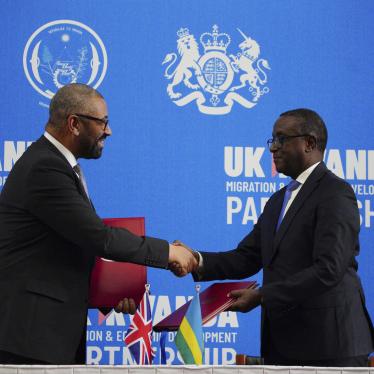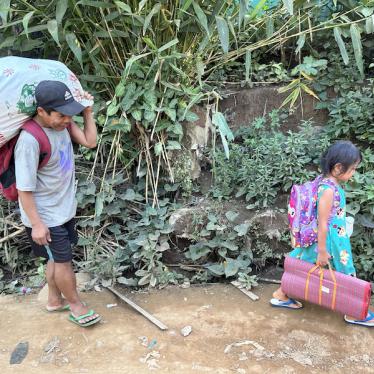At various times in recent generations, members of my family were forced to leave their home countries. My father, born a Muslim in India, was one of thousands who had to relocate during partition in 1947. Thirty years later, my parents preemptively chose to leave Singapore after my father, an academic, published a book critical of the authorities that drew the ire of the government of the day. Fortunately, each time my family was uprooted and forced to start over, we had options. We emigrated to Australia when I was 3, which afforded me the opportunity to become a human rights lawyer.
But what if my family didn’t have those options? What if, instead, the countries in which we sought refuge had turned us back, locked us up, or resettled us in camps where we were left to languish – harsh realities for many of today’s migrants? It’s a question I can’t help but ponder as governments around the world scramble to curb migration, no matter the human cost – or, in many cases, the damage to the human rights principles they ostensibly endorse.
The European Union and its member states have developed a blueprint for circumventing and outsourcing their human rights obligations to asylum seekers and migrants, especially those from Africa and the Middle East. From pushing them back to other countries, to striking deals with abusive governments, to keep them outside of the European bloc, externalization has become the EU’s preferred response to mixed migration. This response has exposed the EU's own double standards in honoring its human rights commitments and contributed to a growing, but unfounded, fear by portraying migration as an unmanageable security concern. Some EU member states have even gone so far as to criminalize providing humanitarian aid to migrants and asylum seekers.
The United States has its own strategies for evading its legal obligations to those seeking to cross its borders. Policies aimed at preventing migrants and asylum seekers from reaching the US, jointly implemented by the US and Mexico, have left many struggling to obtain protection or legal status. The US has closed off legal pathways to entry, criminalized migration, and created a shrinking and unnavigable asylum infrastructure. The human cost is tragic: families ripped apart, protection denied, and asylum seekers stranded in northern Mexico, where they are left vulnerable to being killed, disappeared, raped, extorted, or subjected to other abuses. Meanwhile, US deterrence policies have proven ineffective at reducing migration, while failing to address the causes of displacement or protection needs.
These violations are being carried out despite international legal protections for refugees, migrants, and asylum seekers – protections that have their roots in the Universal Declaration of Human Rights (UDHR) signed at the United Nations 75 years ago. Indeed, the US and EU’s policy gymnastics to prevent migrants and asylum seekers from reaching their soil is a far cry from the principles underlying both the UDHR and the 1951 Refugee Convention. The latter was created in the wake of World War II to ensure that people fleeing persecution would never again be callously left to perish. It outlines a rigorous process to determine who is eligible for asylum and who is not. The treaty falls short in important respects, but for millions of people it has been the difference between life and death.
Yet some authorities choose to ignore this asylum process, shirk their human rights obligations to all migrants, and instead peddle fear for political gain. Sadly, this is not new. In October 2001, Australia, the country that provided so much opportunity for me and my family, was headed into a federal election. The government of Prime Minister John Howard, who had been campaigning on a hardline position against immigration, claimed that a group of asylum seekers headed by boat to Australia had thrown their own children overboard in a cynical ploy to secure rescue.
It was a deliberate lie intended to demonize them as devious and cruel. A government inquiry later found that no children had been thrown overboard, but the most senior government officials, including the prime minister himself, chose to mislead the public and exploit voters’ fears of illegal immigration.
There is a devastating human cost to this callousness. Before Australia started putting refugees and asylum seekers on remote Pacific islands like Nauru and Manus, it locked them up in remote desert detention centers. I worked with people detained in one of them – an abandoned rocket launching site in a desert town called Woomera. Detained for years, people became so desperate that some resorted to drinking bleach in an attempt to end their lives. Others threw themselves on the rolls of razor wire. A group of Afghan women stitched their lips together in a desperate act of protest. As a former social worker, I could see the profound impact on children. Some stopped speaking because of trauma. One boy developed haunting dark sacks under his eyes and would on occasion fall to the ground and lose consciousness from years of internalized stress and anxiety in detention.
We utilized the courts to generate public pressure to shut down Woomera and, eventually, the refugees and asylum seekers were moved to a new facility and processed. It was still deeply problematic, but they had marginally better access to services since their location was less remote. Some were granted refugee status and released. Pro bono lawyers worked their cases, doctors quietly provided free health care. “Circles of friends” were created where groups of volunteers banded together and sponsored families, helping them find housing and register their children for school – showing that even when their leaders fail, their countries still have humanity.
It is this humanity that the human rights field needs to tap into to address cruel migration policies that contradict international human rights law. We have learned important lessons from the EU, the US, and Australia – lessons about how governments will leverage rhetoric, domestic law, and regional policies and politics to evade their responsibilities to refugees, migrants, and asylum seekers. To fight this and uphold human dignity, we must work with an array of partners at the local, national, and international levels to humanize these groups of people and build public and political pressure to protect them.
Providing protection to migrants and asylum seekers is a legal obligation. Those who breach international law should be aware that the truth will catch up to them. In the meantime, we must work together to ensure that our laws and human decency outlive the flawed approaches of our governments.









